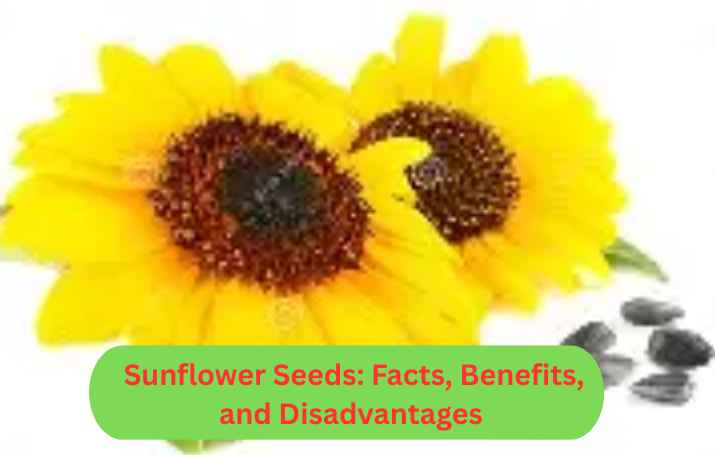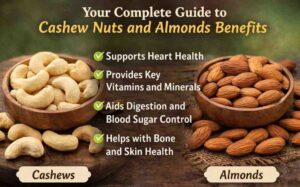
Sunflower Seeds: Facts, Benefits, and Disadvantages

Introduction
Even though Sunflower seeds are small; they are very healthy. People have loved these tiny seeds for many years, whether as a crunchy snack, a salad topping, or an extra healthy ingredient in baked goods. They come from the heart of the sunflower plant (Helianthus annuus).
Sunflower seeds are known to help the heart work better, boost the immune system, and make skin look healthy and beautiful. They are full of healthy fats, vitamins, and antioxidants. They are an effortless and quick way to get more nutrients in your food.
Today, we’re going to talk more about sunflower seeds. We’ll discuss their health benefits, how healthy they are, and what to watch out for if you eat a lot. This guide will tell you everything you need to know about adding them to your food, whether you’re a long-time fan or just want to learn more.
Interesting Facts About Sunflower Seeds
- Origin: Sunflower seeds have been cultivated in North America for over 5,000 years. Native American tribes first grew sunflowers for their seeds and oil.
- Types: There are two main types—confectionery (eaten as snacks) and oilseed (used for extracting sunflower oil).
- Forms: Available as whole seeds (in-shell), hulled (without shells), raw, roasted, salted, or flavoured.
- Nutritional Powerhouse: Despite their size, they’re rich in healthy fats, protein, fibre, vitamins, and minerals.
Nutritional Value (per 30g serving – about 3 tablespoons)
- Calories: ~165 kcal
- Protein: 5.5 g
- Fat: 14 g (mostly unsaturated)
- Carbohydrates: 6 g
- Fibre: 2.5 g
- Vitamin E: ~37% of the RDA
- Magnesium: ~25% of the RDA
- Selenium: ~30% of the RDA
- Folate & B6: Present in smaller yet significant amounts.
Top Health Benefits of Sunflower Seeds
1. Rich Source of Antioxidants: Sunflower seeds are good for you because they are high in vitamins. Vitamin E is found in large amounts in sunflower seeds. It is a fat-soluble antioxidant that helps keep cells safe from reactive stress. It helps the immune system work better, makes the skin feel better, and may lower the risk of getting chronic illnesses.
2. Good for your heart: There is a good mix of unsaturated fats in these seeds, especially linoleic acid, which lowers LDL (“bad”) cholesterol when eaten in moderation. They also have magnesium in them, which helps keep blood pressure and heart rate in check.
3. The ability to reduce inflammation: There are plant-based antioxidants in sunflower seeds, such as vitamin E, flavonoids, and others. These may help reduce inflammation, which is linked to diseases like asthma, arthritis, and metabolic disorders.
4. Aids Blood Sugar Control: Sunflower seeds have fibre and protein that help control how much glucose gets into the body. This keeps blood sugar from rising quickly. People with type 2 diabetes or insulin resistance may find this helpful.
5. Supports Thyroid and Immune Health: Selenium is a mineral that is found in large amounts in sunflower seeds. Selenium is important for keeping your immune system healthy and for breaking down thyroid hormones.
6. Support for bones and muscles: Sunflower seeds have a lot of magnesium, which helps bones stay strong, muscles work well, and nerves send messages. This is especially important for older adults and people who are busy.
7. Helps Healthy Skin: The vitamin E and important fatty acids in sunflower seeds help keep skin hydrated, flexible, and protected from damage from the outside world. They also help slow down the ageing process.
Potential Disadvantages of Sunflower Seeds
Sunflower Seeds are healthy, but too many or prepared ones can be bad for you.
1. High in Calories: Sunflower seeds are high in nutrients, but they also have many calories. Consuming just a few sunflower seeds can add more than 150 calories to your diet. If you don’t watch how many calories you eat, especially when it comes to spiced or salted foods, you could gain weight.
2. Added Salt and Flavouring: Sunflower seeds that are sold in stores are often heavily salted or seasoned with artificial flavours. Getting too much salt can raise your blood pressure and make you more likely to get heart disease. Always read the labels, and if you can, choose foods that aren’t salted or are only lightly salted.
3. Allergic Reactions: Sunflower seeds are not as widely allergenic as peanuts or tree nuts, but some people may be allergic and have symptoms like rashes, asthma, or stomach problems. To begin with, use a small amount if you have never used them before.
4. Heavy Metal Contamination: Cadmium is a heavy chemical that can hurt your kidneys over time if you eat a lot of it. In some places, sunflower plants take it up from the soil. Buying from reputable stores and consuming small amounts can reduce this risk.
5. Dental Damage: Eating in-shell sunflower seeds by cracking them between teeth can cause tooth wear or chipping, especially if done habitually. It’s safer to consume shelled (hulled) seeds.
Best Ways to Include Sunflower Seeds in Your Diet
Here are some simple and nutritious ways to enjoy sunflower seeds:
- Sprinkle over salads for a crunchy texture
- Add to oatmeal or yogurt for extra nutrients
- Mix into homemade granola or trail mix
- Blend into smoothies for a protein and fat boost
- Use in baking—muffins, breads, and cookies
- Incorporate into stir-fries or rice bowls
- Make sunflower seed butter as a nut-free alternative
Final Thoughts
Sunflower Seeds are an effortless and cheap way to add protein, healthy fats, vitamins, and minerals to your diet. Because they are good for you and help your heart and nervous system, they are a great addition to a healthy diet. But the serving size, salt content, and seed quality are all important.
You can eat sunflower seeds as a snack or add them to your best recipes. Each bite is full of health benefits. Moderation is important with any food. Enjoy the benefits while being aware of the possible downsides.



